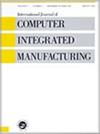面向应用的数字孪生框架和多模型融合机制
IF 3.7
3区 工程技术
Q2 COMPUTER SCIENCE, INTERDISCIPLINARY APPLICATIONS
International Journal of Computer Integrated Manufacturing
Pub Date : 2023-10-05
DOI:10.1080/0951192x.2023.2264820
引用次数: 0
摘要
【摘要】数字孪生(DT)技术通过数据映射将物理空间和虚拟空间相结合,从而促进了设备的全生命周期管理。已经提出了许多叙事DT框架和建模方法。然而,在不同的制造对象和不同的制造场景中应用这些DT框架的过程和方法的异质性限制了DT的功能和推广。鉴于已有关于叙述性DT框架的讨论,本文提出了一种集信息模型、原理模型和场域模型于一体的面向应用的DT框架。然后,讨论了统一DT的应用过程。分别详细阐述了多模型在评价、预测和优化等典型应用中的融合机制。最后,通过车轮多边形诊断数字孪生模型和转向架车架制造优化数字孪生模型对所提出的框架和应用过程进行了验证。通过案例分析,验证了该方法的正确性和可行性。本研究得到国家重点研发计划项目(2020YFB1708000)和四川省自然科学基金项目(2022NSFSC1993)的资助。作者还要感谢梁宏琴和谢家祥为案例研究提供的信息和数据。披露声明作者未报告潜在的利益冲突。基金资助:国家重点研发计划项目[2020YFB1708000];四川省自然科学基金[2022NSFSC1993]。本文章由计算机程序翻译,如有差异,请以英文原文为准。
An application-oriented digital twin framework and the multi-model fusion mechanism
ABSTRACTThe digital twin (DT) technology facilitates the complete lifecycle management of equipment by integrating physical and virtual spaces through data mapping. Many narrative DT frameworks and modeling methods have been proposed. However, the heterogeneous processes and methods of applying these DT frameworks in different objects and different scenarios of manufacturing restricts the function and promotion of DT. Given that there are some existing discussions on narrative DT frameworks, this paper proposes an application-oriented DT framework that integrates information models, principle models, and field models. Then, the unified DT application process is discussed. The mechanism of how to fuse the multi models for typical applications in evaluation, prediction, and optimization are elaborated in detail respectively. Finally, the proposed framework and application process are validated through two DT models: vehicle wheel polygonal diagnosis digital twin and bogie frame manufacturing optimization digital twin. The correctness and feasibility of the proposed approach is demonstrated through these case studies.KEYWORDS: Equipmentapplication-oriented DT frameworkunified application processmulti-modelfusion mechanism AcknowledgementsThis work is financially supported in part by the National Key R&D Program of China (2020YFB1708000) and Natural Science Foundation of Sichuan, China (2022NSFSC1993). The authors also would like to thank Hongqin Liang and Jiaxiang Xie for providing information and data in the case study.Disclosure statementNo potential conflict of interest was reported by the author(s).Additional informationFundingThis work was supported by the National Key Research and Development Program of China [2020YFB1708000]; Natural Science Foundation of Sichuan Province [2022NSFSC1993].
求助全文
通过发布文献求助,成功后即可免费获取论文全文。
去求助
来源期刊
CiteScore
9.00
自引率
9.80%
发文量
73
审稿时长
10 months
期刊介绍:
International Journal of Computer Integrated Manufacturing (IJCIM) reports new research in theory and applications of computer integrated manufacturing. The scope spans mechanical and manufacturing engineering, software and computer engineering as well as automation and control engineering with a particular focus on today’s data driven manufacturing. Terms such as industry 4.0, intelligent manufacturing, digital manufacturing and cyber-physical manufacturing systems are now used to identify the area of knowledge that IJCIM has supported and shaped in its history of more than 30 years.
IJCIM continues to grow and has become a key forum for academics and industrial researchers to exchange information and ideas. In response to this interest, IJCIM is now published monthly, enabling the editors to target topical special issues; topics as diverse as digital twins, transdisciplinary engineering, cloud manufacturing, deep learning for manufacturing, service-oriented architectures, dematerialized manufacturing systems, wireless manufacturing and digital enterprise technologies to name a few.

 求助内容:
求助内容: 应助结果提醒方式:
应助结果提醒方式:


